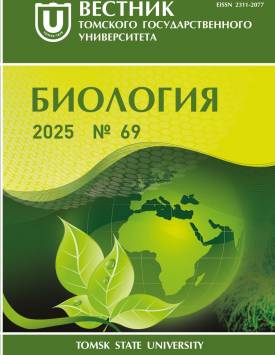Approaches to the analysis of alternative splicing events in human placental decidual cells
The alternative splicing study (AS) is of considerable interest to researchers, since this process is fundamental in molecular biology and leads to the expression of various protein isoforms from a single gene. Alternative splicing is known to regulate the expression of genes involved in the development and functioning of the placenta. It is known that one of the decisive events for the successful implantation of the embryo and the development of the placenta is the differentiation of endometrial stromal cells into decidual cells, which play a key role both in maintaining physiological pregnancy, in this regard, they are the most interesting object for the study of AS events during pregnancy. The aim of the study is to analyze and characterize the events of alternative splicing in decidual cells during physiological pregnancy. MAJIQ, rMATS, and SGSeq programs are selected for the analysis of AS events. Thus, in the total array of the control group, 3501 annotated AS events for 2731 genes were identified using the MAJIQ; 66687 events for 14784 genes were identified using the rMATS; 15782 events for 5616 genes were identified using the SGSeq. The next step was to classify all events according to 7 types of AS for the MAJIQ and SGSeq, and 5 types of events for the rMATS (See Fig. 1). When searching for common genes, low replication of the results was shown (33.9%), since only 5,387 genes were identified in at least two programs at the same time. In order to provide a more detailed functional annotation of genes affected by AS, 1857 genes common to all three programs were analyzed (See Fig. 2). The analysis of the protein-protein network reconstructed using the "STRING" program included 386 protein products (high confidence = 0.999) and 98 clusters. These genes are associated with chromatin modification, transcription regulation, intercellular signaling, cell migration, intercellular adhesion, immune system, apoptosis, and the NF-kappaB signaling pathway according to the detailed functional annotation in the GeneOntology, KEGG, Reactome databases. These signaling pathways are crucial for the development and maintenance of fetal health and their violation can lead to various obstetric pathologies, in connection with which it seems relevant to further study this mechanism of RNA processing in a cohort of patients with obstetric pathology. The article contains 2 Figures, 12 References. The Authors declare no conflict of interest.
Keywords
alternative splicing, whole transcriptome sequencing, placenta, decidual cells, MAJIQ, rMATS, SGSeqAuthors
| Name | Organization | |
| Gavrilenko Maria M. | Research Institute of Medical Genetics of the Tomsk Scientific Research Center | maria.gavrilenko@medgenetics.ru |
| Trifonova Ekaterina A. | Research Institute of Medical Genetics of the Tomsk Scientific Research Center | ekaterina.trifonova@medgenetics.ru |
| Babovskaya Anastasia A. | Research Institute of Medical Genetics of the Tomsk Scientific Research Center | anastasia.babovskaya@medgenetics.ru |
| Zarubin Aleksey A. | Research Institute of Medical Genetics of the Tomsk Scientific Research Center | aleksei.zarubin@medgenetics.ru |
| Swarovskaya Maria G. | Research Institute of Medical Genetics of the Tomsk Scientific Research Center | maria.swarovskaja@medgenetics.ru |
| Izhoykina Ekaterina V. | Siberian State Medical University; Regional Perinatal Center named after I.D. Evtushenko | katushkabig@mail.ru |
| Stepanov Vadim A. | Tomsk Scientific Research Center | genetics@tnimc.ru |
References

Approaches to the analysis of alternative splicing events in human placental decidual cells | Vestnik Tomskogo gosudarstvennogo universiteta. Biologiya - Tomsk State University Journal of Biology. 2025. № 69. DOI: 10.17223/19988591/69/6
